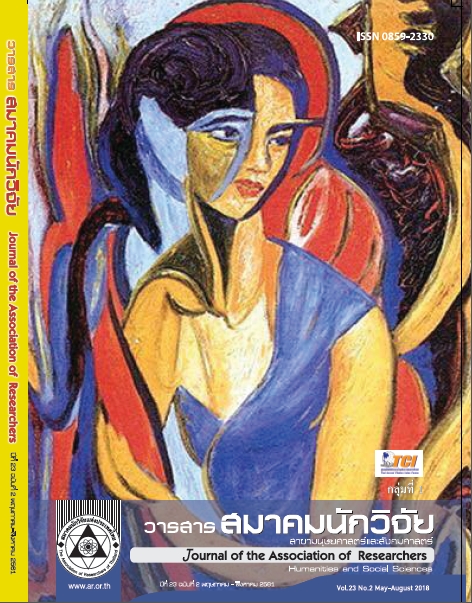Role of Middle Commissioned Army Officers who influence on Changing of Thai Politics
Main Article Content
Abstract
The propose of this study included three main objectives, first, to examine the causes or reasons of middle commissioned officers in seize power by Coup D’état. Second, to examine, what factors influence the middle commissioned officers in seize power by Coup D’état, and lastly to propose the model of solving coup d’état problem in case of Thai politics of the general public in Bangkok metropolitan. The population of this research is commissioned officers in Royal Thai Army organizations. The sample for the opinion survey is middle commissioned officers (MCO) who attached to the Royal Thai Army War College and Command and General Staff College; total 418 participants. The quantitative analysis applies the questionnaire for reliability tests on Cronbach’s alpha coefficient using both descriptive and inferential statistics, multiple regressions and path analysis from the equation model, and structural equation modeling (SEM), LISREL program was used to identify the model. In additional, in supporting the study output as quantitatively, the qualitatively conducted via the in-depth interviewing and documents, the Interviewed specialist targets composed of 15 key informants (three of each in Generals, and four of each in Senior Colonel, Colonel, Lieutenant Major and Major respectively). The study found that MCO seize power by Coup D’état due to the four motive factors; First, the effect of jurisprudence (double legal standard, Interpretation of law and amnesty). Second, interests group (conflict of interest social movement, influence to political). Third, military organization behavior (splendid of discipline, authoritarian personality, show of force). Lastly, military democratic behavior (military relations with civilians, Political participation, the ritual of Sovereignty). Briefly, the effect of jurisprudence has the most influence follow with interest groups, military organization behavior and military democratic behavior, respectively. Additional with two opportunities factors cause the MCO seize power by Coup D’état, first, the unresolvable of political problems in civil government, second, lack of civil government security in various dimensions (social, economic, political, etc.) which incur to cleavage and civil war, then the civil government had to overthrow and replace by military government intervene to solve the problems. At the appropriate time, it is necessary to return the democratic sovereign right to vote in accordance with the appropriate rules in the future. And the resolving of seizing power must be untie and rectify the civilian government by administration the country with moral system as good governance and taking into account the benefits to the people, depending on the three party leaders of legislation, administrative and judiciary. These three functions must be the main mechanisms in the administration of the nation by emphasising and following the good governance system. At last, the best way to solve the seize power by Coup D’état is not given an amnesty to the guilty of seizing the power by revolution and coup anymore.
Article Details
บทความที่ปรากฏในวารสารนี้ เป็นความรับผิดชอบของผู้เขียน ซึ่งสมาคมนักวิจัยไม่จำเป็นต้องเห็นด้วยเสมอไป การนำเสนอผลงานวิจัยและบทความในวารสารนี้ไปเผยแพร่สามารถกระทำได้ โดยระบุแหล่งอ้างอิงจาก "วารสารสมาคมนักวิจัย"
References
_____________ (2551). รัฐศาสตร์ “ทฤษฎีแนวคิด ปัญหาสำคัญ และแนวทางศึกษา วิเคราะห์การเมือง”. กรุงเทพฯ : สหายบล็อก.
_____________ (2555). กำรเมืองไทย : ระบบที่ไม่มีสูตรสำเร็จในการแก้ปัญหา. กรุงเทพฯ: สำนักพิมพ์ ปัญญาญาณ.
ทวีเกียรติ มีนะกนิษ. (2552). หลักนิติธรรมกับการตรากฎหมายนิรโทษกรรม จุลนิติ ปีที่ 6 ฉบับที่ 61 (พ.ย.-ธ.ค. 2552) หน้า 5.
เพิ่มศักดิ์ ไทยธานี และวินัย ผลเจริญ. (2555). ทหารกับการสืบทอดอำนาจทำงการเมืองไทย การเมืองกำรปกครอง มหาวิทยาลัยมหาสารคาม.
มาริษ คุณากร. (2553). อิทธิพลของการเคร่งศาสนา ความรู้สึกแปลกแยกและค่านิยมประชาธิปไตยที่มีต่อพฤติกรรมแบบ ประชาธิปไตย (การมีส่วนร่วมทางการเมืองและการต่อต้านเผด็จการ) ดุษฎีนิพนธ์ บัณฑิตวิทยาลัย มหาวิทยาลัย ราชภัฏสวนสุนันทา.
ลิขิต ธีรเวคิน. (2556). ความถูกต้องตามกฎหมาย ความชอบธรรมทางการเมืองและธรรมแห่งอำนาจ. สำนักพิมพ์ มหาวิทยาลัยธรรมศาสตร์.
สุรชาติ บำรุงสุข. (2558). เสนาธิปไตย: รัฐประหารกับการเมืองไทย. พิมพ์ครั้งแรก สำนักพิมพ์มติชน. มกราคม 2558.
References
Almond, GA, and Powell, G Bing ham. (1966). Comparative Politics : Developments Approach, Boston and Toranto, Brown and Company.
Likhit Dhiravegin. (2013). Legality, Legitimacy, Moral Authority.Thammasat press. (In Thai).
Maris Kunakorn. (2010). The Influence of Religiosity, Alienation and Democratic Values on democratic Behavior. Dissertation for Graduate School of Suansunandha Rajabhat University. (In Thai).
Permsak Thaitanee and Virai Poncharoen. (2012). : The military and the Perpetuation of Power in Thai Politics : A case study of Council for Democratic Reform, College of Politics and Governance. Mahasarakham University. (In Thai).
Samuel E. Finer, The man on HorseBack : The Role of the military in Politics Middle sex Penguin Books, 1976. Samuel P.Huntington, The soldier and the State : The theory and Politics of Civil.military Relations : Newyork : Vintage Book, 1957.
Surachart Bumrungsuk. (2015). Militocracy : Military Coup and Thai Politics. 1st ed, Matichon public Co.Ltd. (In Thai).
Taweekiat Meenakanit. (2009) : The rule of Law and amnesty bill : Julniti Vol.6 No 61 (Nov-Dec 2009) Pg.5 (In Thai).
Tinnapan Nakata. (2006). Political Philosophy : Bangkok Journal of the Association of Thai University. (In Thai).
_____________ (2008). Political Science “Theory, Conceptual Framework, the significant of problem and political Analysis” : Bangkok : Shay block. (In Thai).
_____________ (2012). Thai Politic : Unsuccessful system to solve the problems. Bangkok, Intellectuals publishing. (In Thai).


